-
A cronicidade e o seu impacto na saúde do trabalhador: uma chamada para ações concretas
Revista Brasileira de Enfermagem. 2023;76:e76suppl301
Abstract
A cronicidade e o seu impacto na saúde do trabalhador: uma chamada para ações concretas
Revista Brasileira de Enfermagem. 2023;76:e76suppl301
DOI 10.1590/0034-7167.202376suppl301pt
Views0A relação entre cronicidade e trabalho tem sido uma preocupação crescente na sociedade contemporânea. À medida que o número de doenças crônicas aumenta em todo o mundo, é fundamental compreender como essas condições impactam a saúde dos trabalhadores(). Neste editorial, exploraremos os impactos da cronicidade na saúde do trabalhador, destacando dados da Carga Global de […]See more -
Chronicity and its impact on workers’ health: a call for concrete actions
Revista Brasileira de Enfermagem. 2023;76:e76suppl301
Abstract
Chronicity and its impact on workers’ health: a call for concrete actions
Revista Brasileira de Enfermagem. 2023;76:e76suppl301
DOI 10.1590/0034-7167.202376suppl301
Views0The relationship between chronicity and work has been a growing concern in contemporary society. As the number of chronic illnesses increases around the world, it is critical to understand how these conditions impact workers’ health(). In this editorial, we will explore the impacts of chronicity on workers’ health, highlighting data from the Global Burden of […]See more -
General Law on Personal Data Protection and applicability to Nursing
Revista Brasileira de Enfermagem. 2023;76:e20230126
Abstract
General Law on Personal Data Protection and applicability to Nursing
Revista Brasileira de Enfermagem. 2023;76:e20230126
DOI 10.1590/0034-7167-2023-0126
Views0See moreABSTRACT
Objectives:
to reflect on the impacts of the General Personal Data Protection Law on Nursing practice.
Methods:
reflection article, through the intentional collection of materials relating to the topic.
Results:
legislation regulates confidentiality, processing and data sharing, requiring institutional protection measures. The nursing team is responsible for acting preventively, both in care and in the management role, in order to avoid the misuse of the patient’s personal data. The law allows academic research to be carried out as long as the purpose is clear, data collection occurs with an explicit purpose and data is anonymized.
Final Considerations:
although the General Personal Data Protection Law requires greater care in relation to data processing, it is established on precepts of good faith and respect for the rights of the individual, concepts aligned with the nursing code of ethics.

-
REVIEW12-04-2023
Supervision of professional nursing practice in Brazil: a scoping review
Revista Brasileira de Enfermagem. 2023;76:e20230077
Abstract
REVIEWSupervision of professional nursing practice in Brazil: a scoping review
Revista Brasileira de Enfermagem. 2023;76:e20230077
DOI 10.1590/0034-7167-2023-0077
Views0See moreABSTRACT
Objectives:
to map studies that analyze the audit process of nursing councils.
Methods:
this is a scoping review, anchored in the JBI framework, with the guiding question: what is the evidence of the audit process of legal practice of nursing by class councils (COFEN/COREN system)? The searches were carried out in October and November 2022 without limitation of language and year.
Results:
of the 9 selected studies, all are Brazilian and published from 2014 onwards. Among the topics addressed are the role, challenges, costs and difficulties in nurse auditors’ daily work process, in addition to the contribution of the audit sector in Brazil.
Conclusions:
the studies gathered discuss aspects related to costs, challenges and difficulties, but there is no focus on corrective, disciplinary and educational activities as well as little is said about the audit process, its reporting, referral and outcomes.

-
ORIGINAL ARTICLE12-04-2023
Overview of nursing ethics teaching in Brazilian public higher education institutions
Revista Brasileira de Enfermagem. 2023;76:e20220808
Abstract
ORIGINAL ARTICLEOverview of nursing ethics teaching in Brazilian public higher education institutions
Revista Brasileira de Enfermagem. 2023;76:e20220808
DOI 10.1590/0034-7167-2022-0808
Views0See moreABSTRACT
Objectives:
to outline the teaching of ethics in undergraduate Nursing programs in Brazilian public higher education institutions.
Methods:
descriptive and exploratory study, carried out through the documentary analysis of pedagogical projects of undergraduate Nursing programs in Brazil.
Results:
153 active undergraduate Nursing programs were found, of which 106 provide the pedagogical project. In addition to deontological teaching, the teaching of ethics was identified in a transversal way associated with themes such as Social Context, Hospital and Community Care, Pharmacology, Systematization of Nursing Care, Surgical Nursing, Epidemiology, Palliative Care, Management in Nursing, Diversity, Women’s, Children’s, Adolescent’s, Adult’s and Older People’s Health, and Mental Health.
Final Considerations:
the challenge in teaching nursing ethics is its integration with each action of caring, teaching and managing.

-
Ethical dilemmas at the end of life: a reflection from the Philosophical Perspective of Luigina Mortari
Revista Brasileira de Enfermagem. 2023;76:e20220759
Abstract
Ethical dilemmas at the end of life: a reflection from the Philosophical Perspective of Luigina Mortari
Revista Brasileira de Enfermagem. 2023;76:e20220759
DOI 10.1590/0034-7167-2022-0759
Views0See moreABSTRACT
Objectives:
to reflect on the ethical dilemmas involved in the care of patients at the end of their lives.
Methods:
this is a theoretical-reflective study based on the ethics of care proposed by Luigina Mortari.
Results:
discussing care involves addressing the ways of being inherent to human existence and understanding the unique characteristics of this condition. Ethical care constitutes an action driven by interest in the other and by the perception of their need. Ethical dilemmas are a part of end-of-life care, making it essential to maintain respectful assistance that considers the patient’s autonomy, using strategies for expressing their wishes, and ensuring continuous clear and empathetic communication among all those involved in providing care.
Final Considerations:
issues related to being, stemming from one’s reality of dependency and vulnerability, contribute to the emergence of ethical dilemmas present in care actions.
-
ORIGINAL ARTICLE07-29-2024
Primary Health Care in transitional care of people with stroke
Revista Brasileira de Enfermagem. 2024;77(3):e20230468
Abstract
ORIGINAL ARTICLEPrimary Health Care in transitional care of people with stroke
Revista Brasileira de Enfermagem. 2024;77(3):e20230468
DOI 10.1590/0034-7167-2024-0468
Views0ABSTRACT
Objectives:
to understand the role of Primary Health Care teams in caring for people with stroke after hospital discharge.
Methods:
single case study, with integrated units of analysis, with a qualitative approach. Data triangulation occurred through interviews with professionals and family caregivers involved in transition of care, in addition to direct observations in rounds and document analysis. For the analyses, the analytical strategies of theoretical propositions and construction of explanations were used, with the help of ATLAS.ti®.
Results:
the importance of counter-referral, the role of community health workers and the multidisciplinary team, health promotion, secondary prevention, home visits as a visceral attribute and nurses as care managers are evident.
Final Considerations:
the high demand on teams and the Social Determinants of Health interfere with adequate continuity of care. Transitional care programs that enable continuity of care are recommended.
Keywords:Comprehensive Health CareContinuity of Patient CarePrimary Health CareStrokeTransitional CareSee more -
ORIGINAL ARTICLE07-29-2024
Completeness of variables in Hospital-Based Cancer Registries for prostatic malignant neoplasm
Revista Brasileira de Enfermagem. 2024;77(3):e20230467
Abstract
ORIGINAL ARTICLECompleteness of variables in Hospital-Based Cancer Registries for prostatic malignant neoplasm
Revista Brasileira de Enfermagem. 2024;77(3):e20230467
DOI 10.1590/0034-7167-2023-0467
Views0See moreABSTRACT
Objectives:
to analyze the completeness of variables from Hospital-Based Cancer Registries of cases of prostate neoplasm in the Oncology Care Network of a Brazilian state between 2000 and 2020.
Methods:
an ecological time series study, based on secondary data on prostate cancer Hospital-Based Cancer Registries prostate. Data incompleteness was classified as excellent (<5%), good (between 5%-10%), fair (10%-20%), poor (20%-50%) and very poor (>50%), according to the percentage of lack of information.
Results:
there were 13,519 cases of prostate cancer in the Hospital-Based Cancer Registries analyzed. The variables “family history of cancer” (p<0.001), “alcoholism” (p<0.001), “smoking” (p<0.001), “TNM staging” (p<0.001) had a decreasing trend, while “clinical start of treatment” (p<0.001), “origin” (p=0.008) and “occupation” (p<0.001) indicated an increasing trend.
Conclusions:
most Hospital-Based Cancer Registries variables showed excellent completeness, but important variables had high percentages of incompleteness, such as TNM and clinical staging, in addition to alcoholism and smoking.
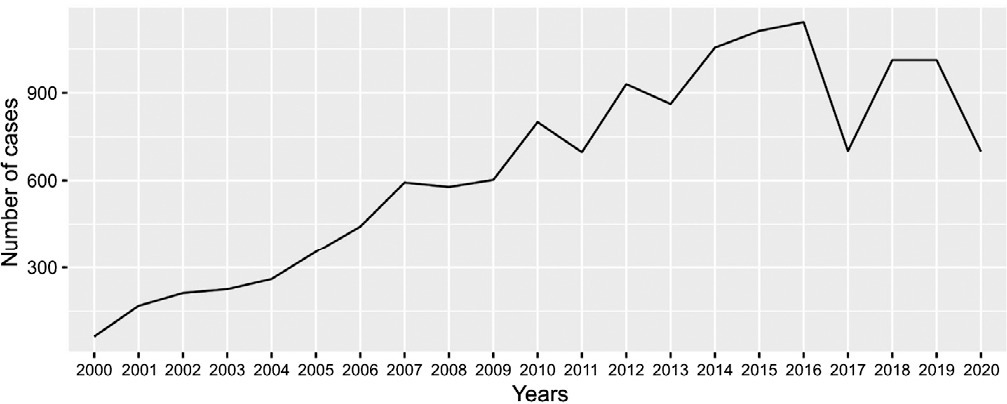
-
ORIGINAL ARTICLE07-29-2024
Disrupted mother-fetus dyad risk in high-risk pregnancies: a Middle-Range Theory
Revista Brasileira de Enfermagem. 2024;77(3):e20230464
Abstract
ORIGINAL ARTICLEDisrupted mother-fetus dyad risk in high-risk pregnancies: a Middle-Range Theory
Revista Brasileira de Enfermagem. 2024;77(3):e20230464
DOI 10.1590/0034-7167-2023-0464
Views0See moreABSTRACT
Objectives:
to develop and evaluate a Middle-Range Theory for the nursing diagnosis “Disrupted Mother-Fetus Dyad Risk” in high-risk pregnancies.
Methods:
this methodological study was conducted in two stages: theory development and evaluation. Dorothea Orem’s General Nursing Model was used as the theoretical-conceptual foundation. Evaluation was conducted using the Delphi method with seven judges, and consensus was achieved when the Content Validity Index of the evaluated items was ≥ 0.80.
Results:
the theory identified 20 elements of the nursing diagnosis “Disrupted Mother-Fetus Dyad Risk” (10 risk factors, 4 at-risk populations, and 6 associated conditions), 14 propositions, and 1 pictogram. After two rounds of evaluation, the theory was considered consistent, with consensus reached for all items, each achieving a Content Validity Index ≥ 0.80.
Conclusions:
the Middle-Range Theory included biopsychosocial factors explaining the nursing phenomenon “Disrupted Mother-Fetus Dyad Risk,” which aids in nurses’ diagnostic reasoning.
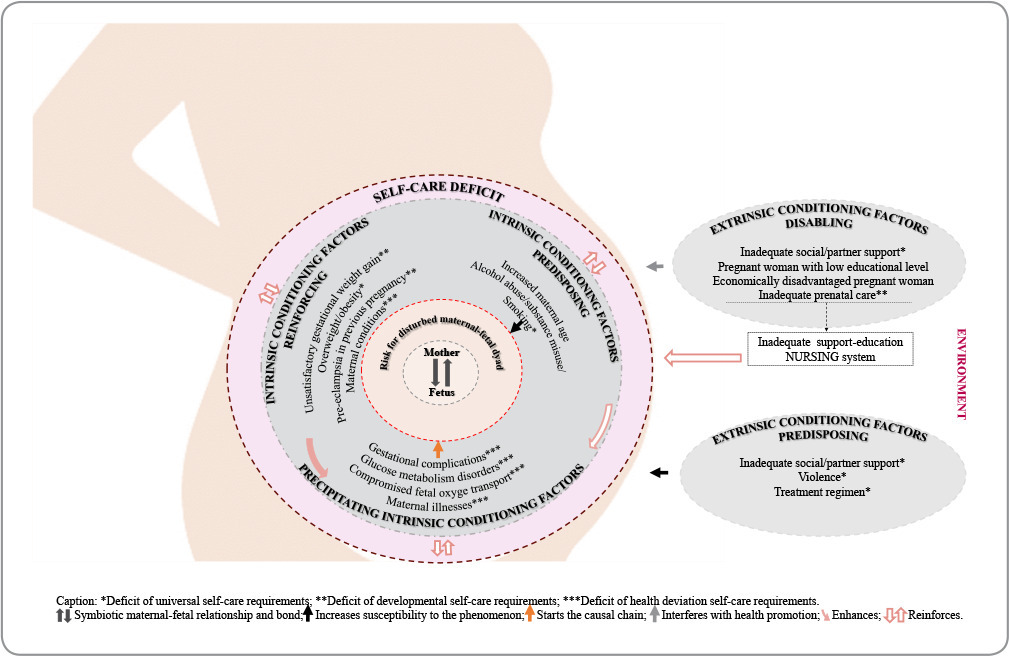
-
ORIGINAL ARTICLE07-29-2024
Mental health of parents of children and adolescents who require special health care
Revista Brasileira de Enfermagem. 2024;77(3):e20230457
Abstract
ORIGINAL ARTICLEMental health of parents of children and adolescents who require special health care
Revista Brasileira de Enfermagem. 2024;77(3):e20230457
DOI 10.1590/0034-7167-2023-0457
Views0See moreABSTRACT
Objective:
To identify the manifestations presented by parents of children and adolescents who require special health attention that can impact their mental health.
Methods:
exploratory, qualitative research, based on the concept of vulnerability, with data collection carried out through interviews with 18 parents of children and adolescents with special health care needs, hospitalized in the pediatric ward of a hospital in Paraná, between May/2017 and May/ 2018. Data analyzed by inductive thematic analysis.
Results:
parents experienced situations of vulnerability when providing care at home, with repercussions on their mental health, expressed by manifestations of lack of protection, anxiety and depression.
Final considerations:
It is important that health professionals seek to expand actions to promote care and reduce situations that generate threats, insecurities, concerns and damage to the health of parents, which can impact and further weaken care for children and adolescents who need attention especially health.
-
REVIEW07-29-2024
Profile of scientific production on nursing technology construction, validity and application: a bibliometric study
Revista Brasileira de Enfermagem. 2024;77(3):e20230452
Abstract
REVIEWProfile of scientific production on nursing technology construction, validity and application: a bibliometric study
Revista Brasileira de Enfermagem. 2024;77(3):e20230452
DOI 10.1590/0034-7167-2023-0452
Views0See moreABSTRACT
Objective:
to analyze the profile of scientific production on nursing technology construction, validity and application.
Methods:
this is a bibliometric study, carried out in six databases, based on the Methodi Ordinatio application, arranged in nine stages. To represent the findings, the VOSviewer® software was used.
Results:
346 studies were identified, obtained from BDENF, CINAHL, EMBASE, LILACS, PubMed/MEDLINE, Scopus and Web of Science. There was a predominance of the English language, and 20% of the authors hold more than 25% of studies. Only two journals account for 25% of studies in the period studied. Twenty-six studies were selected for the InOrdinatio classification. Nursing Process (23%) stood out among the studies. The most produced technology was software (27%), and 50% of works describe construction and validity.
Conclusions:
there is an emphasis on the creation of educational technologies, especially information technology. The data demonstrates opportunities for future research in the area.

-
ORIGINAL ARTICLE07-29-2024
Evaluation of software technical quality for collecting data from patients under palliative care
Revista Brasileira de Enfermagem. 2024;77(3):e20230435
Abstract
ORIGINAL ARTICLEEvaluation of software technical quality for collecting data from patients under palliative care
Revista Brasileira de Enfermagem. 2024;77(3):e20230435
DOI 10.1590/0034-7167-2023-0435
Views0See moreABSTRACT
Objectives:
to evaluate software technical quality for collecting data from patients under palliative care.
Methods:
this is methodological technology evaluation research, according to the technical standard International Organization for Standardization/International Electrotechnical Commission 25040-2011, developed from August 2021 to August 2023. Eight nurses and eight information technology professionals participated as judges, who evaluated six quality characteristics and 23 subcharacteristics. Items that reached a percentage of agreement greater than 70% were considered suitable.
Results:
the characteristics evaluated by nurses/information technology professionals received the following percentages of agreement, respectively: functional suitability (94%-84%); reliability (100-70%); usability (89.9-66.8%); performance efficiency (95.8%-86.1%); compatibility (95.8-79.6%); and safety (96%-83.4%).
Conclusions:
the software was considered suitable in quality evaluation to offer support to nurses in collecting patient data under palliative care, with the potential to operationalize the first Nursing Process stage.
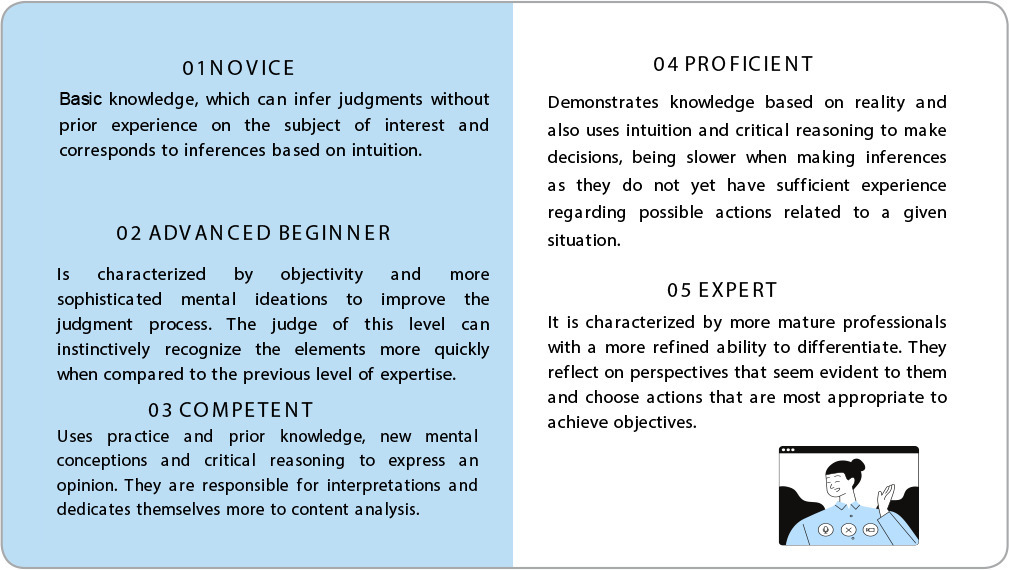
-
ORIGINAL ARTICLE07-29-2024
Sexual counseling for people with acute coronary syndrome: educational video development
Revista Brasileira de Enfermagem. 2024;77(3):e20230416
Abstract
ORIGINAL ARTICLESexual counseling for people with acute coronary syndrome: educational video development
Revista Brasileira de Enfermagem. 2024;77(3):e20230416
DOI 10.1590/0034-7167-2023-0416
Views0See moreABSTRACT
Objective:
to assess validity evidence of an educational video on safe sexual activity after acute coronary syndrome.
Method:
study in three phases: video development; content validity analysis by 11 experts; and analysis of validity based on response processes by seven people with coronary disease. The content validity ratio (CVR) was calculated with critical values for the second phase of 0.63 and for the third of 1.0.
Results:
the video addressed the importance of resuming sexual activity and positions that consume less energy, clinical warning signs, the importance of adhering to treatment and a welcoming environment for sexual practice. A CVR above the critical value was obtained with a total of 4 minutes and 41 seconds.
Conclusion:
the educational video brings together adequate content validity evidence and can be used as a tool for patients after acute coronary syndrome.
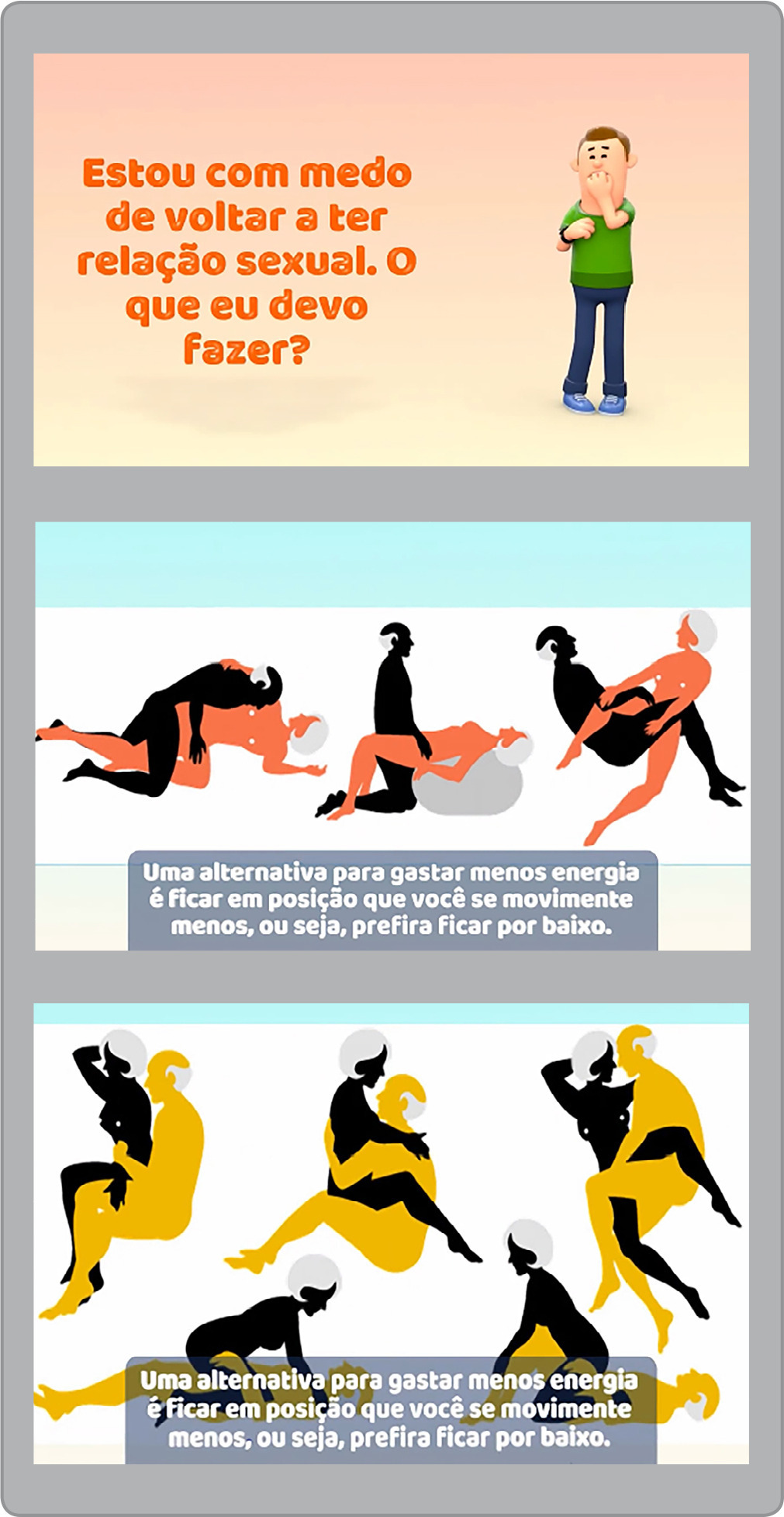
-
REVIEW07-29-2024
Utilization of local pressure devices in pain management during injections: scoping review
Revista Brasileira de Enfermagem. 2024;77(3):e20230399
Abstract
REVIEWUtilization of local pressure devices in pain management during injections: scoping review
Revista Brasileira de Enfermagem. 2024;77(3):e20230399
DOI 10.1590/0034-7167-2023-0399
Views0See moreABSTRACT
Objective:
to map scientific evidence regarding the use of local pressure devices in pain relief during injection procedures in patients.
Methods:
scoping review, following the recommendations of the JBI Manual for Evidence Synthesis and PRISMA-ScR, with searches conducted in the PubMed, EMBASE, CINAHL, LILACS, and PsycINFO databases, without temporal restrictions and with a cutoff date of March 2023.
Results:
a total of 1,514 studies were identified, with 20 articles included in the final sample. The ShotBlocker® device was utilized during subcutaneous and intramuscular injections in children and adults, proving beneficial in reducing pain, anxiety, and fear associated with the procedure.
Final considerations:
the ShotBlocker® is a low-cost, easy-to-use device that can enhance nursing clinical practice during painful procedures. However, studies involving the Brazilian Pikluc® device are scarce. Further research involving both local pressure devices is recommended.
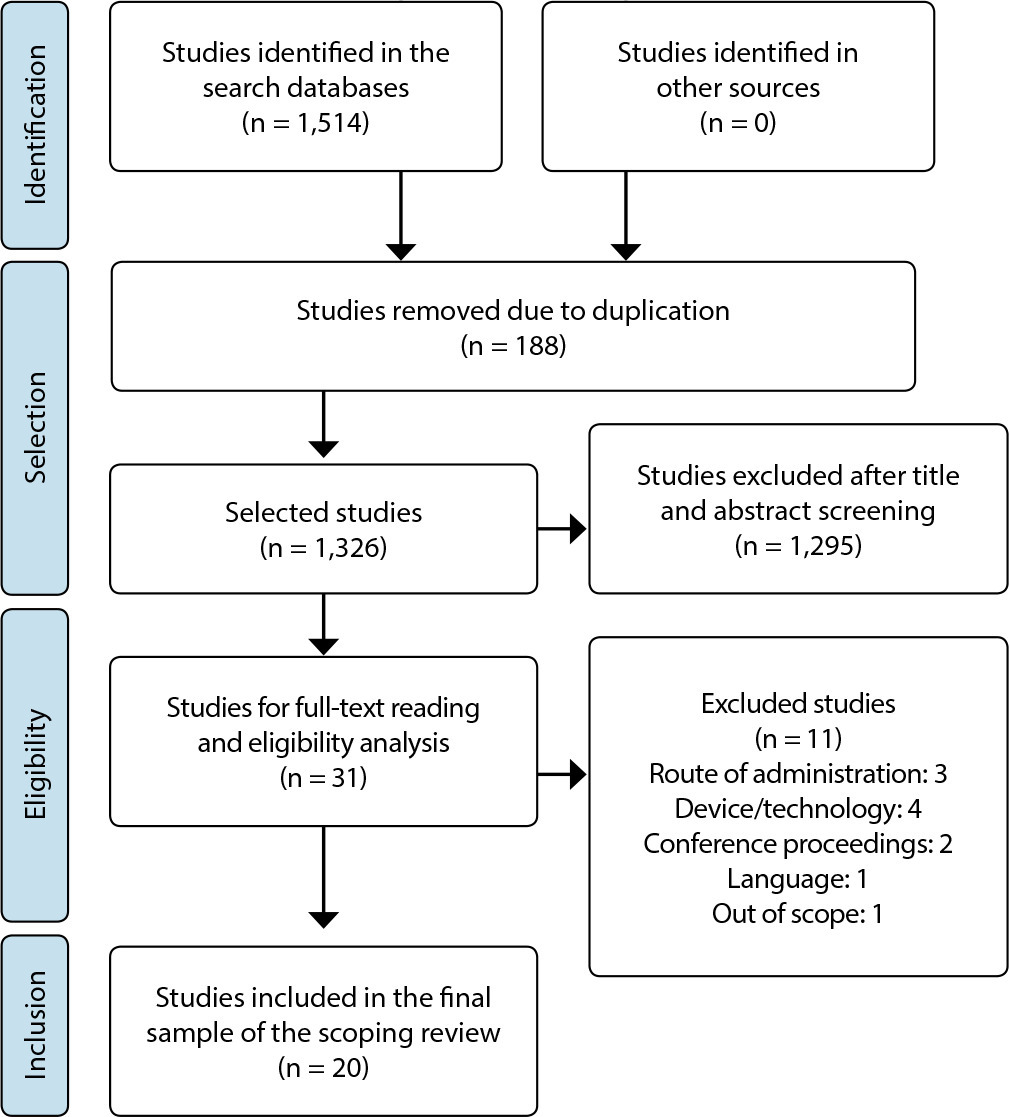
-
ERRATUM
Revista Brasileira de Enfermagem. 2016;69(5):1002-1002
Abstract
ERRATUM
Revista Brasileira de Enfermagem. 2016;69(5):1002-1002
DOI 10.1590/0034-7167.20166905e01
Views0Article “Alcohol and alcoholism: attitudes of nursing students”, with number of DOI: http://dx.doi.org/10.1590/S0034-71672013000100013, published in the journal Revista Brasileira de Enfermagem, v66(1):84-9, page 89 that read:“18. Miranda SP, Vargas D. Satisfação de pacientes de um centro de atenção Psicossocial álcool e drogas com o atendimento do enfermeiro. SMAD, Rev Eletrônica Saúde Mental Alcool Drog 2019;5(2):1-15”.[…]See more -
REVIEW01-01-2016
Research methodology for nursing and health: a book review
Revista Brasileira de Enfermagem. 2016;69(5):1000-1001
Abstract
REVIEWResearch methodology for nursing and health: a book review
Revista Brasileira de Enfermagem. 2016;69(5):1000-1001
DOI 10.1590/0034-7167-2015-0135
Views1For those interested in nursing and health, the book entitled “Research methodology for nursing and health: from theory to practice”() was released in October 2015, at the 67th Brazilian Congress of Nursing, sponsored by National ABEn. The interest emerged from two organizers: Dr. Maria Ribeiro Lacerda (UFPR) and Dr. Regina Gema Santini Costerano (UNIFRA). Forty-seven […]See more -
Violence in the workplace in Nursing: consequences overview
Revista Brasileira de Enfermagem. 2016;69(5):996-999
Abstract
Violence in the workplace in Nursing: consequences overview
Revista Brasileira de Enfermagem. 2016;69(5):996-999
DOI 10.1590/0034-7167-2015-0133
Views0See moreABSTRACT
Objective:
to reflect on the consequences of workplace violence experienced by nursing professionals.
Methods:
this is a reflection paper based on recent publications related to the subject, particularly researches carried out in Brazil and in other countries.
Results:
exposure to workplace violence has been associated with health problems in nursing professionals, which may be physical damage, emotional manifestations, and psychic disorders. It also affects the employee performance, his or her family and social interactions.
Conclusion:
this phenomenon is potentially noxious and costly, for it leads to suffering, illness, absence from work, and even death. This reflection calls attention moreover to the importance of a safe and adequate health care work environment.
-
REFLECTION01-01-2016
Construcción de la enfermera de práctica avanzada en Catalunya (España)
Revista Brasileira de Enfermagem. 2016;69(5):991-995
Abstract
REFLECTIONConstrucción de la enfermera de práctica avanzada en Catalunya (España)
Revista Brasileira de Enfermagem. 2016;69(5):991-995
DOI 10.1590/0034-7167.2016690507
Views0RESUMEN
El desarrollo de la enfermera de práctica avanzada (EPA) ha supuesto un reto para las enfermeras en países como EE.UU., Canadá, Gran Bretaña y Australia, entre otros, y desde hace escasos años está siendo considerada en Catalunya y España como un sistema para desarrollar nuevos roles que aporten eficacia y eficiencia al sistema sanitario. El presente artículo pretende conceptualizar la EPA y los modelos de referencia así como contextualizar y reflexionar sobre la EPA en Catalunya, desde el punto de vista de formación y de la implantación de los denominados nuevos roles de enfermería, asimilándolos a la práctica avanzada.
Keywords:Competencia ClínicaEnfermeríaEnfermería de Práctica AvanzadaPráctica ProfesionalRol de la EnfermeraSee more -
Developing the Advanced Practice Nurse in Catalonia
Revista Brasileira de Enfermagem. 2016;69(5):991-995
Abstract
Developing the Advanced Practice Nurse in Catalonia
Revista Brasileira de Enfermagem. 2016;69(5):991-995
DOI 10.1590/0034-7167.2016690507
Views0See moreABSTRACT
The development of advanced practice nurses (APN) has proved a challenge for nurses in countries such as the USA, Canada, Great Britain, and Australia among others. It is only in recent years that the system has been considered in Catalonia and Spain as a way to develop new roles to bring effectiveness and efficiency to the health system. From the standpoint of training and implementation of the above-mentioned new nursing roles, the following article aims to conceptualise APN and its reference models, as well as to contextualise and reflect on APN in Catalonia in order to assimilate them into advanced practice.
-
International academic mobility in nursing education: an experience report
Revista Brasileira de Enfermagem. 2016;69(5):986-990
Abstract
International academic mobility in nursing education: an experience report
Revista Brasileira de Enfermagem. 2016;69(5):986-990
DOI 10.1590/0034-7167-2015-0128
Views0See moreABSTRACT
Objective:
report the experience of international academic mobility in Ireland through the program Science Without Borders during undergraduate education in nursing.
Method:
a report of experience presented in chronological order, with a descriptive nature.
Results:
the opportunity to know and be able to discuss questions regarding health and nursing in Ireland allowed the review of concepts and a more reflective perspective regarding nursing practices. Additionally, the exchange promoted personal strengthening regarding the confrontation and solution of problems, development of technical and scientific abilities, improvement of linguistic competences and construction of personality, independence and maturity.
Conclusion:
regarding such constructive and enriching experience that this mobility provides to students, to the governing authorities, to the population and to Brazilian nursing, sharing this experience is expected to serve as encouragement for those who search for new horizons, with the objective of adding knowledge for their personal and professional life.
-
Online training for health professionals in three regions of Brazil
Revista Brasileira de Enfermagem. 2016;69(5):981-985
Abstract
Online training for health professionals in three regions of Brazil
Revista Brasileira de Enfermagem. 2016;69(5):981-985
DOI 10.1590/0034-7167.2016690506
Views0See moreABSTRACT
Objective:
to describe online training experience aimed at professionals working in the public health service in 27 Neonatal and Pediatric Intensive Care Units, and to reflect concerning the training process and possible improvements in this process.
Method:
this is an experience report study about the online training with multidisciplinary content, planned from the situational diagnosis of 27 institutions. The training target set was 10 participants per institution and per module, including the following topics: Indicators of Quality as a Management Tool, Hand Hygiene, Patient Safety, Intravenous Therapy and Patients’ Chart Record.
Results:
a total of 2,071 active students in the modules, with 1,046 approved. The mean of 76 students per module exceeded the target set.
Conclusion:
experience has shown that online training is comprehensive as a potential tool for the professional technical development and digital inclusion. The online learning system becomes weakened if participants are unaware of the technological resources.
-
Technologies in intensive care: causes of adverse events and implications to nursing
Revista Brasileira de Enfermagem. 2016;69(5):972-980
Abstract
Technologies in intensive care: causes of adverse events and implications to nursing
Revista Brasileira de Enfermagem. 2016;69(5):972-980
DOI 10.1590/0034-7167.2016690505
Views0See moreABSTRACT
Objective:
to identify the causes of adverse events affecting clients resulting from the use of equipment in intensive care services; to point out the main recommendations for clinical practice to minimize these events and, then, discuss the implications to nursing care.
Method:
integrative and descriptive review on the SciELO, Medline, LILACS, and PubMed databases. Articles were selected based on the inclusion criteria and the structured instrument was applied.
Results:
altogether, 11 articles were selected where three evidence units were outstanding: Equipment failure; inadequate use of equipment; and team failure. Permanent education of professionals; evaluation of production and availability of equipment; and use of checklists are recommended.
Conclusion:
preventing adverse events related to equipment is one of the nursing responsibilities and requires the establishment of defensive barriers to prevent these.
Search
Search in:
Nuvem de Tags
Aged (144) Atenção Primária à Saúde (239) COVID-19 (104) Cuidados de Enfermagem (269) Educação em Enfermagem (151) Educação em Saúde (139) Enfermagem (930) Estudos de Validação (131) Health Education (144) Idoso (208) Mental Health (149) Nursing (987) Nursing Care (306) Patient Safety (151) Primary Health Care (284) Qualidade de Vida (104) Quality of Life (106) Saúde Mental (145) Segurança do Paciente (150) Validation Studies (108)



